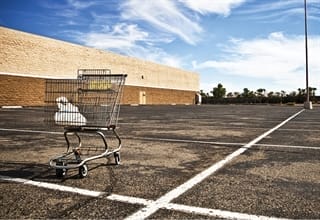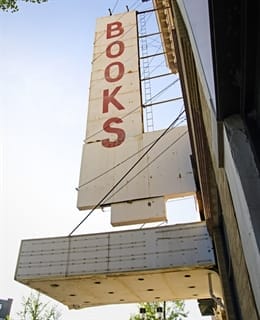What we have seen happen in retail is mirrored throughout the economy
Have you noticed that your local store is increasingly likely to be closed? I have felt the decline of bricks-and-mortar retail most acutely in the dearth of bookstores, places where I used to decompress during the lunch hour or to which I was dispatched so my wife could properly shop. But we all see the decline in the mausoleums that used to be known as shopping malls.
“Ghost malls” are now sites for urban spelunking and photo essays. There is even a Facebook group for “dead mall enthusiasts.” Locally, we see malls such as Bayshore Town Centre and the Shops of Grand Avenue desperately try to reinvent themselves time and again, while big retailers such as Ashwaubenon-based Shopko eventually give up and shut down.
Everyone offers their own reasons for the death of a particular mall (too many teenagers wilding at the Orange Julius) or store (a declining neighborhood or unappealing merchandise). But the most obvious explanation is online shopping.
We no longer need the mall because we carry it in our pocket. We don’t go to the store. It comes to our doorstep.
There is a certain cyclicality here. Sears, Roebuck and Company began as a mail order business. Department stores and malls arose as the country urbanized, and automobiles made us more mobile. What technology created, it also destroys.
So it is with free enterprise. Capitalism has led to remarkable human flourishing but, in the midst of this prosperity, it has increasingly come under attack from both the left and the right. The death of malls and factories and even entire industries may tell us why.
Capitalism inevitably involves creative destruction. This is not a bug; it’s a feature. Innovations such as the automobile and airplane displace travel by horse and train (as well as the farriers and blacksmiths and the engineers and porters who served them). This disruption makes us richer, but it comes, as progress inevitably must, with a cost.
What we have seen happen in retail is mirrored throughout the economy.
Technology (and, to a lesser degree, the innovation called globalization) reduces and changes the nature of manufacturing jobs. The digital revolution shutters paper mills (Wisconsin lost a third of its paper mills in the past two decades). Towns and even regions that were dependent on these changing industries and disappearing jobs may have difficulty adjusting. Some may never adjust.
This is not a new process, but it seems that Republicans have only just discovered it. Fox News host Tucker Carlson rails against a “free-market worship.” F.H. Buckley, in his new book, “The Republican Workers Party,” offers a more sophisticated argument for (sort of) walking back the traditional GOP commitment to markets.
Websites such as American Greatness and journals such as American Affairs publish work that calls for an economic nationalism involving greater degrees of government intrusion into markets and more aggressive use of the state to protect the interests of, not to put too fine a point on it, Republican voters.
This isn’t all bad, and it isn’t entirely wrong.
For the past 40 years, American conservatism has been, essentially, classical liberalism tempered with social conservatism. Contrary to the pessimists on the right who claim that conservatives “never conserve anything” and fail to “win,” the Reaganite turn in the GOP has been phenomenally successful both electorally and with respect to policy.
It revived the Republican Party from the more or less permanent minority status it occupied from the 1930s to the ’90s. It won the Cold War and, notwithstanding the myth of the disappearing middle class, contributed to a broad prosperity. The effect of this conservative “fusionism” on the culture has been less robust but, even there, progress has been made on public attitudes toward abortion and a reinvigoration of marriage among more educated Americans.
But the right has not routed the left, and the markets it has championed are not perfect. The gains of “creation” may outweigh the costs of “destruction,” but the costs are real. And while communities and workers may adjust over time, we are, as John Maynard Keynes said, “all dead in the long run.”
It is not true that “Conservatism, Inc.” or Republican “elites” have failed to see that markets have costs. But the outpouring of support in the 2016 presidential primaries for Donald Trump who, at the very least, stands in uncomfortable tension with traditional American conservatism, could be a salutary wake-up call. It could serve as a reminder that, while markets work better than anything else, people must be empowered to participate in them.
Nevertheless, it should remain the responsibility of American conservatives to emphasize that our lodestar is liberty and that the role of the government is to help its citizens build their lives — not to do the job itself.
I miss all those bookstores. I have fond memories of Northridge Mall and the old and more robust Grand Avenue. But there’s no going back. We can’t return, and we shouldn’t want to.
I don’t need to detail the errors of socialism here. It is a form of nostalgia for a failed dream. But we have our own “nostalgianomics” on the right.
Excluding foreign products — or, for that matter, foreign workers — will not make America great again. America is great because of its first principles: free markets, free people, free communities.
As circumstances change, we apply those principles in different ways. But we ought never abandon them.
Richard Esenberg is president of the Wisconsin Institute for Law & Liberty.






